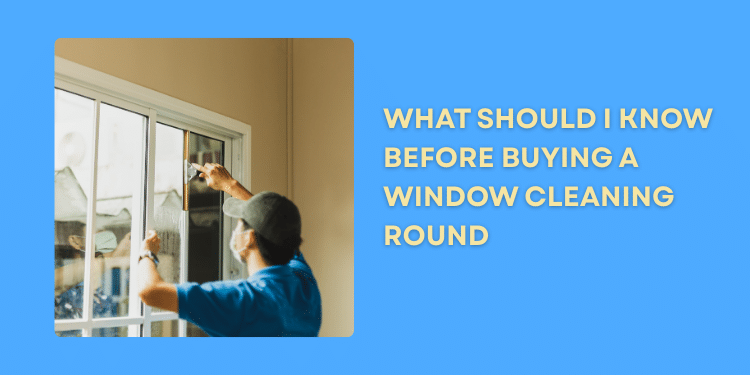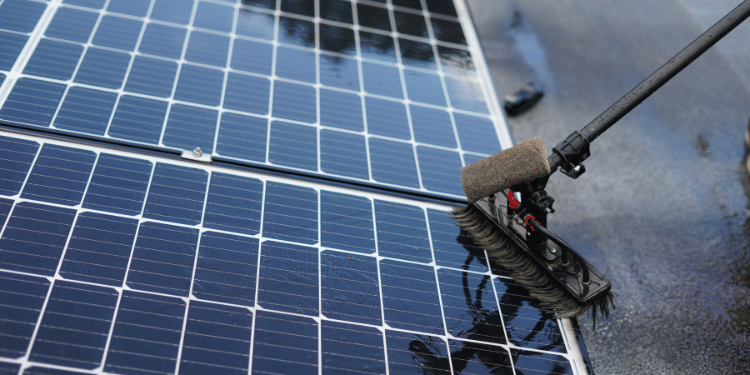Have you ever thought about starting your own window cleaning business? Or maybe you’re already a window cleaner, and you’re looking to grow your customer base. Either way, buying a window cleaning round could be the perfect next step for you.
A window cleaning round is a list of regular customers who pay for window cleaning services, usually on a monthly or bi-monthly basis.
When you buy a round, you’re essentially buying a small business or part of one. The round comes with pre-existing customers, fixed prices, and often a set route to follow. It’s like stepping into someone else’s shoes and continuing their work.
However, like any business acquisition, it’s not a decision to be taken lightly. A successful purchase depends on doing your homework, asking the right questions, and understanding the true value of what you’re buying. This guide will explain everything you need to know to make a smart, informed decision.
Let’s get started.

How Much Should I Pay for a Window Cleaning Round?
This is the question on every prospective buyer’s mind, and the answer isn’t as simple as a flat number. The price of a window cleaning round is almost always based on a multiple of its average monthly turnover.
Generally, a window cleaning service sells for anywhere between 8 to 12 times its monthly value. For example, if a round generates a monthly revenue of $1,000, its asking price would likely be between $8,000 and $12,000. Some factors can push this multiple higher or lower, but this is a solid benchmark.
What Are You Really Paying For?
When a seller presents you with a window cleaning round, they’re not just handing over a piece of paper with names and addresses. You are buying a living, breathing business asset. Its value is determined by a combination of tangible and intangible elements.
First, and most importantly, is the customer list. This is the core of the round. A good list should be detailed and verifiable. It should include the customer’s name, address, contact information, the frequency of their service (e.g., every 4, 6, or 8 weeks), and the price they pay.
A well-organized, clean list is a sign of a professional operation. Conversely, a list that’s just a scribble on a notepad is a major red flag.
Second, you’re buying the schedule and route. An efficient round is one where the jobs are geographically clustered, minimizing travel time and fuel costs. A well-optimized route means you can serve more customers in a day, which directly impacts your profitability. A seller who can show you a logical, well-planned route is offering a far more valuable asset than one with scattered, inefficient jobs.
Third is the pricing structure. Are the jobs priced fairly and competitively for the market? A round with prices that are too low will limit your profit margins, while a round with overly high prices might lead to customer churn once you take over. You need to verify that the prices are sustainable and profitable for you.
Finally, you’re buying the goodwill and reputation of the previous owner. Customer loyalty is a significant part of the value. A round with a long-standing, happy customer base built on trust and excellent service is a highly desirable asset.
Factors That Influence the Price of a Cleaning Round
It is important to understand the difference between residential and commercial rounds. A residential round typically involves cleaning the windows of homes. These jobs are often smaller in value but are usually more numerous and can be a stable source of income.
Commercial rounds, on the other hand, focus on businesses, offices, and storefronts. While these contracts may be fewer in number, they often have a much higher value per job and can provide more consistent, year-round work, which is especially important in climates with harsh winters.
Other factors include:
- Location: A round in a densely populated, affluent area with minimal travel between jobs will be worth more than one spread across a large, rural region.
- Customer Density: How close are the customers to one another? A compact, efficient round saves you time and fuel, making it more valuable.
- Customer Type: Commercial contracts, especially those with long-term agreements, are often considered more valuable than residential clients.
- Customer Retention Rate: The number of customers who stay with the business over time is a key indicator of its health. A low churn rate suggests a loyal and well-served customer base.
- Method of Cleaning: Was the round serviced using a traditional squeegee and bucket, or a modern water-fed pole system? The method impacts the type of equipment you’ll need and how you’ll service the clients, so it’s a critical consideration.
It is important to remember that the advertised price is just the asking price. You can, and should, negotiate. Your ability to negotiate will depend on your due diligence. The more you know about the round’s strengths and weaknesses, the stronger your position will be.
Must-Ask Questions When Buying a Window Cleaning Round
Before you hand over any money, you need to conduct a thorough investigation. A great seller will be open and transparent. A bad one will be evasive. Your job is to be an investigator, not a shopper.
Financial Verification:
- Can you provide financial records? (Invoices, bank statements, tax returns.)
- Is the advertised monthly turnover accurate and verifiable? Be wary of “cash-in-hand” jobs without a paper trail.
- How are payments typically collected (e.g., cash, bank transfer, online payment)? This impacts your future operational setup.
Customer and Operations Analysis:
- How many customers are there, and what is the exact split between residential and commercial?
- What is the customer retention rate? Why have customers left in the past year?
- How is the work distributed? Ask to see the route on a map to assess its efficiency.
- What is the average time it takes to complete the round? This will help you calculate your hourly rate and profitability.
- What is the reason for the sale? Be attentive to the answer. A good reason might be retirement or a career change; a bad one might be frustration with the business or a decline in profitability.
Red Flags to Watch For:
- Unverifiable financials: If the seller can’t or won’t provide documentation, walk away. No deal is better than a bad deal.
- High customer churn: If a significant number of customers have stopped using the service recently, there’s a problem, and you will inherit it.
- An overly spread-out route: A seller might boast a large monthly income, but if it takes you twice as long to complete the work due to travel time, it’s not as profitable as it seems.
- Outdated equipment: If the sale includes equipment, make sure it’s in good working order. Old, poorly maintained gear is a liability, not an asset.
The Post-Purchase Strategy: Making it Your Own
The day you buy the round is the start of the real work. The transition from the old owner to you is a delicate period, and how you handle it will determine your long-term success.
1. Communication is Key:
Your first priority is to introduce yourself to every single customer. A personal introduction, ideally with the previous owner present, builds trust and minimizes customer drop-off. Send out a friendly letter or email to inform them of the change, reassure them that service quality will be maintained, and provide your new contact information.
2. Systemize Your Operation:
The round may have worked for the previous owner, but now it’s your business. Implement modern systems to make your life easier. Use scheduling software to manage your routes, a CRM (Customer Relationship Management) system to track customer details and communication, and a professional invoicing system for easy payments. This is where you can truly add value.
3. Grow and Upsell:
Once you’ve established yourself with the existing customers, look for opportunities to grow. The easiest way to grow is to upsell additional services. Offer gutter cleaning, pressure washing, or soft washing. A customer who trusts you with their windows will likely trust you with other cleaning needs. This not only increases your revenue per client but also strengthens the relationship, making them more loyal to your brand.
4. Focus on Marketing:
Even with an established round, you need to market your business. Encourage happy customers to leave online reviews. A strong online presence with positive testimonials can attract new clients organically. Over time, you can expand the round by doing neighborhood marketing or even investing in targeted local ads.
A window cleaning round is a springboard, not a destination. It gives you a stable foundation to build a much larger, more diverse cleaning business.
Conclusion
Buying a window cleaning round is an exciting and strategic move. It gives you a fantastic head start, an immediate income stream, and a loyal customer base. The key to a successful purchase lies in doing your research, asking the right questions, and having a clear plan for the future. Don’t let the opportunity overshadow the need for careful due diligence.
Whether you’re a new owner looking for guidance or an established company aiming to upgrade your operations, ClearView Services provides the commercial cleaning solutions in Kent that set you apart from the competition with cleaning services that ensure every client receives a level of service that builds trust and loyalty.



